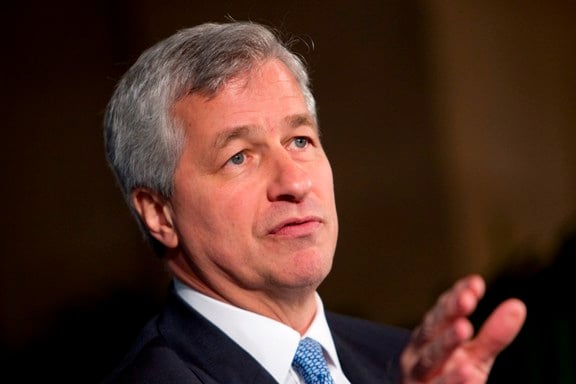

JPMorgan CEO Jamie Dimon has joined a growing group of Wall Street executives expressing concern over the current rapid-fire pace of tariff threats.
Dimon, who previously downplayed concerns over tariffs, is now warning that uncertainty surrounding trade policy could have real consequences for businesses.
“I don’t think the average American consumer who wakes up in the morning and goes to work… changes what they’re going to do because they read about tariffs,” he said in an interview with Semafor. “But I do think companies might."
While Dimon's comments did not mention President Donald Trump by name, they do highlight growing angst around the commander-in-chief's approach to trade policy. Since February, Trump has unleashed a flurry of often contradictory tariff orders at multiple trading partners including China, Mexico, and Canada.
Most recently on Thursday, he threatened to impose a 200 percent tariff on alcoholic beverages from Europe in retaliation for a 50 percent tariff imposed on American spirits.
"Uncertainty is not a good thing,” Dimon said.
His comments mark a shift from his stance earlier this year when he told business leaders at the World Economic Forum in Davos to “get over it” regarding tariffs. At the time, he argued that tariffs could serve as either “an economic tool” or “an economic weapon,” depending on how they were implemented.
Since then, market volatility has intensified. The S&P 500 has gone down more than 7 percent over the past month, though broader markets rebounded on Wednesday. Economic concerns are also mounting, with some executives pointing to tariffs as a factor contributing to a slowdown in business activity.
Larry Fink, CEO of BlackRock, said he is seeing signs of economic weakness linked to trade tensions. “The collective impact in the short run is that people are pausing, they’re pulling back,” Fink told CNN. “Talking to CEOs throughout the economy, I hear that the economy is weakening as we speak.”
Still, Fink suggested that in the long term, the administration’s trade policies could lead to lower tariffs.
“Right now the president is focusing on tariffs, but when he talks about reciprocal tariffs, actually, that may bring down tariffs over the long run,” he said.
Goldman Sachs CEO David Solomon also weighed in, saying policy uncertainty is making businesses hesitant to engage in mergers and capital investments.
“The level of uncertainty is a little bit higher, and that has kept some things on the sidelines,” Solomon said in an interview with Fox Business Wednesday. “The more we can have certainty on the policy agenda as we move forward, the better that’s going to support capital investment and growth.”
Solomon was among the audience of top executives President Donald Trump met with at the Business Roundtable in Washington on Tuesday, where he warned of the potential for more tariffs at possibly higher rates.
"I think the business community understands what the president is trying to do with… tariffs," Solomon said. "The business community is always going to want lower tariffs everywhere… in the world."

Rajesh Markan earlier this year pleaded guilty to one count of criminal fraud related to his sale of fake investments to 10 clients totaling $2.9 million.

From building trust to steering through emotions and responding to client challenges, new advisors need human skills to shape the future of the advice industry.

"The outcome is correct, but it's disappointing that FINRA had ample opportunity to investigate the merits of clients' allegations in these claims, including the testimony in the three investor arbitrations with hearings," Jeff Erez, a plaintiff's attorney representing a large portion of the Stifel clients, said.

Chair also praised the passage of stablecoin legislation this week.

Maridea Wealth Management's deal in Chicago, Illinois is its first after securing a strategic investment in April.
Orion's Tom Wilson on delivering coordinated, high-touch service in a world where returns alone no longer set you apart.
Barely a decade old, registered index-linked annuities have quickly surged in popularity, thanks to their unique blend of protection and growth potential—an appealing option for investors looking to chart a steadier course through today's choppy market waters, says Myles Lambert, Brighthouse Financial.
